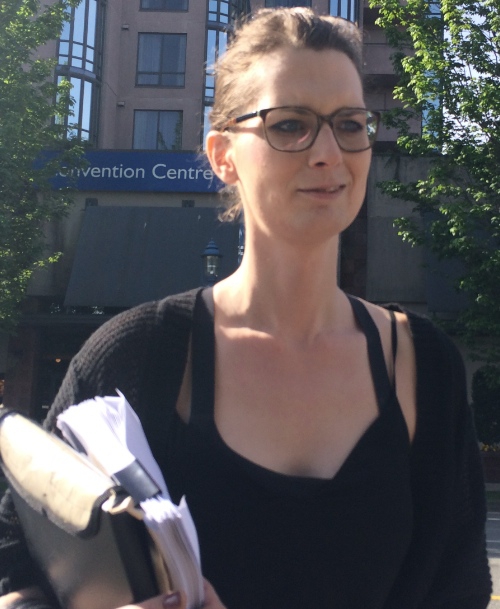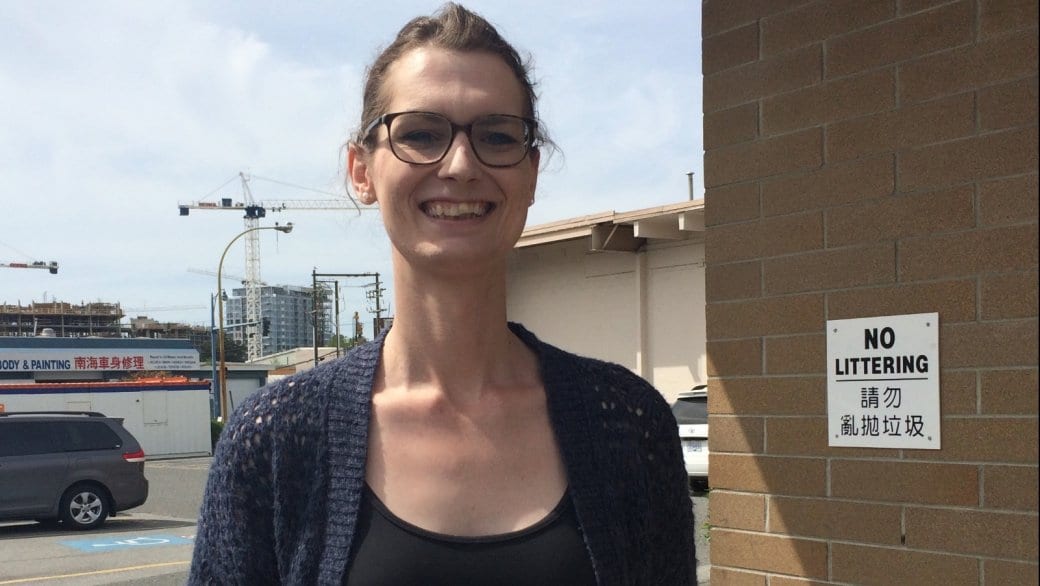The woman accused of burning a Pride flag at the University of British Columbia arrived for her second appearance in court on May 17, 2016, ready to ask a judge to dismiss the charge against her. But a procedural question around filling out the proper application changed her mind.
Brooklyn Marie Fink instead pleaded not guilty to the charge of mischief she’s facing in connection with the February 2016 Pride flag burning incident at UBC.
“Notwithstanding the fact that I admitted to doing the protest, in the interest of public health and safety, I plead not guilty,” she told a justice of the peace at the Richmond courthouse.
The justice of the peace transferred Fink to a different courtroom to officially enter her not-guilty plea before a judge.
Outside the courtroom, Fink tells Daily Xtra burning the flag was an act of civil disobedience, of political protest — not of criminal mischief.
“It’s civil disobedience taken one step too far,” she says. “Taking the flag down was putting the bad guy in handcuffs. Burning it was kicking him while he was down.”

(Brooklyn Marie Fink spoke to reporters outside of court after her first appearance on April 26, 2016./Robin Perelle/Daily Xtra)
After her first court appearance in April, Fink told Daily Xtra outside the courthouse that many of her friends are queer but she chafes at what she considers the imposition of LGBT politics on her life.
Fink, who is transsexual, said she was trying to live her life “stealth” — as a woman, rather than a trans woman — when UBC raised the Pride flag and hosted OUTweek in February. She said she wishes transgender activists would “stop assuming I’m in on their political movement.”
Outside of court after her second appearance today, Fink tells reporters she’s unhappy with the federal Liberal government’s introduction of a bill to protect gender identity and expression.
“Now it’s up to everybody to phone your politicians” and encourage them not to pass this “trans bill of rights,” she says.
Fink says trans people are already protected from discrimination on the basis of sex and disability; they don’t need protection on the basis of their gender identity or expression.
She says the proposed protection is “confusing a queer sense of fashion” with the medical necessity some transsexual people have to transition. “It’s a tragedy,” she says.
Fink says she was particularly dismayed to see a young trans girl speak to reporters in Ottawa about the bill. That little girl was paraded before the legislature and now she’s never going to get the chance to just be a girl; she will always be a trans girl, Fink says.

(Brooklyn Marie Fink says she’s still waiting to hear the result of her non-academic misconduct hearing at UBC./Robin Perelle/Daily Xtra)
After the media scrum, Fink tells Daily Xtra she’s still waiting to hear from the president of UBC regarding her status at the university, after her non-academic misconduct hearing on May 10.
“In the spirit of restorative justice,” Fink says, she proposed the creation of a new permanent sculpture across from the UBC flagpole, crafted in the shape of a thunderbird with one talon outstretched to hold flags other than the official UBC flag.
This way, she says, “we might have 52 different flag-raising ceremonies per year.”
Fink, who is currently prohibited from entering the Point Grey campus and had to withdraw from her courses last semester, says she hasn’t heard a response to her sculpture suggestion.
The president could decide to expel her completely, readmit her to UBC with conditions, or readmit her without conditions, she says.
Regardless of the outcome of her UBC misconduct hearing, Fink will return to court for a pre-trial application on Jan 12, 2017, followed by a three-day trial starting March 15, 2017, on the mischief charge.

 Why you can trust Xtra
Why you can trust Xtra


